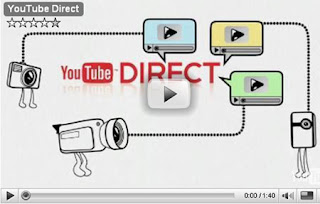Tuesday, November 24, 2009
Bing and News Corp
It’s interesting that this interview done about a month ago was so right in predicting the current intrigue going on between Microsoft and News Corporation. Basically, Jason Calacanis laid out his theory that one way to finally break Google’s hold on the search market was to partner with various news organizations, pay them for their content, and get them to exclusively let that content be accessed by a search engine like Bing.
The New York Times published a piece today on the negotiations that News Corp is currently in with Microsoft to do exactly that. Basically, Microsoft would pay them for the opportunity to exclusively index it’s content and News Corp would then completely remove all of it’s content from Google. This is an interesting idea that would obviously largely affect consumer’s access to all of the online video content of News’ Corp’s publications. Additionally, it could largely affect the business model of future media endeavors on the Internet from the current model to something similar to the “cable” model that we’ve been studying in class.
Is this a good business decision? Wired thinks not.
Monday, November 23, 2009
YouTube Direct
Here is a really fascinating piece, published by the New York Times last week, which describes the new Youtube technology that various news organizations are beginning to take advantage of, and incorporating into their business models. “Youtube Direct” is a service that outlets such as The Huffington Post, San Francisco Chronicle, and NPR are using to manage user-generated video content for their sites.
This is exciting because it provides an easier way for a sense of communication to be established through video content on MSM channels. For example, a publication such as the Rocky Mountain News could ask for funny or interesting video on local Colorado news, people could submit it through this service, and it would then find a new home of the outlet’s site. This could be an effective business model not only as a result of driving people to a site, but also a new model on online video citizen journalism.
This is exciting because it provides an easier way for a sense of communication to be established through video content on MSM channels. For example, a publication such as the Rocky Mountain News could ask for funny or interesting video on local Colorado news, people could submit it through this service, and it would then find a new home of the outlet’s site. This could be an effective business model not only as a result of driving people to a site, but also a new model on online video citizen journalism.
Tuesday, November 17, 2009
NPR Reports On Future Of Web Video
On yesterday's All Things Considered, Omar Gallaga discussed the future business models and technology that may support the viewing of web video content on HD televisions. In addition to various companies and technology that I've previously discussed on this blog such as Boxee, Gallaga also brought up some really interesting new ventures that I had not been previously aware of.
First of all, The New York Times reported earlier this week on the new company "Clicker." Clicker hopes to be a "TV Guide for the web." It seems to be an appropriate company to bring up this week since we've been discussing the importance of search for the future of media. Clicker hopes to act as a sort of "search" for online video. Where you may be able to easily find some select network's shows on sites such as Hulu, Clicker will be able to point you to content as far-ranging as TED talks to video from NYTimes.com!! Exciting! If this takes off, the focus and importance placed on legally uploaded footage from established media companies could be great for those businesses.
First of all, The New York Times reported earlier this week on the new company "Clicker." Clicker hopes to be a "TV Guide for the web." It seems to be an appropriate company to bring up this week since we've been discussing the importance of search for the future of media. Clicker hopes to act as a sort of "search" for online video. Where you may be able to easily find some select network's shows on sites such as Hulu, Clicker will be able to point you to content as far-ranging as TED talks to video from NYTimes.com!! Exciting! If this takes off, the focus and importance placed on legally uploaded footage from established media companies could be great for those businesses.
Labels:
all tech considered,
clicker,
my tv guide,
web video
Thursday, November 5, 2009
Telegraph Arts Videos
I'm in love with this video, and a lot of the other videos on The Telegraph's website. I think that they are doing a great job of creating captivating online video content that can stand alone on their own merits. I think this piece does just that. First of all, the video content in the piece really centers around strong sound bites. The reporter was sent to Georgia to document the way that women live there, and framed his journey as a search to “find the most beautiful woman” in Georgia. Through the interview with the older man and later the conversation in the car, the treatment of women in the country is explored in interesting ways. Also, the clip of the women singing is fascinating, even if it adds less to the story.
Tuesday, November 3, 2009
NBC To Feature HD Video on Olympics Site
NBCOlympics.com, scheduled to go live tomorrow, features a lot of great interactive video content. NBC will be using Microsoft Silverlight technology to offer full HD videos on the site reports Tech Crunch. Additionally, the video player will have a DVR-like feature! This will allow visitors to the sit to rewind videos, highlight clips, save them etc.
Another cool video feature, that NBC will be unveiling tomorrow is the incorporation of facebook chat with the videos. With this, people will be able to chat with friends while watching videos. I definitely think that this added connectivity could greatly increase view counts. It will be interesting to see whether it will prove popular enough to be added to video content in the future.
Truce Between White House and Fox?
As the intriguing “war” between Fox News and the White House raged on for the last few weeks, I think everyone was curious as to how it might end. Well, Fishbowl DC reported last week that a sort of “truce” had apparently been brokered. Putting aside whether or not this conflict was good for the country, was fanning the flames of this war of words good for Fox News?
From a business perspective it seems to have been. After displaying graphics across their opinion programming such as “Not White House Approved” on Hannity, Fox saw it’s ratings increase over the past week. It is interesting what the effect of “becoming the story” is on news’ organizations. Whether or not it’s good for their news, it does seem to be good for their business.
Is Journalism in a Crisis?
Jeff Jarvis argues against the popular notion that the journalism industry is currently facing a huge crises in today’s issue of The Guardian. The main reason that he sees for realizing this fact is the current push for government supported media. With the recent publication of The Reconstruction of American Journalism by Columbia University there has been a lot of buzz surrounding the idea of government sponsored media like the BBC in England.
Jarvis argues that a government supported business model of journalism is unnecessary and may prove detrimental to journalism’s purpose in society. He cites the fact that some view the BBC as an unfair competitor in England, and that it creates a distortion on the internet.
I’m not that familiar with England’s media landscape to know whether that it is true or not, but I do think that there’s something to be said for embracing change rather than surrendering to it. Perhaps more attention should be paid on developing solutions for the former.
Jarvis argues that a government supported business model of journalism is unnecessary and may prove detrimental to journalism’s purpose in society. He cites the fact that some view the BBC as an unfair competitor in England, and that it creates a distortion on the internet.
I’m not that familiar with England’s media landscape to know whether that it is true or not, but I do think that there’s something to be said for embracing change rather than surrendering to it. Perhaps more attention should be paid on developing solutions for the former.
Subscribe to:
Posts (Atom)







